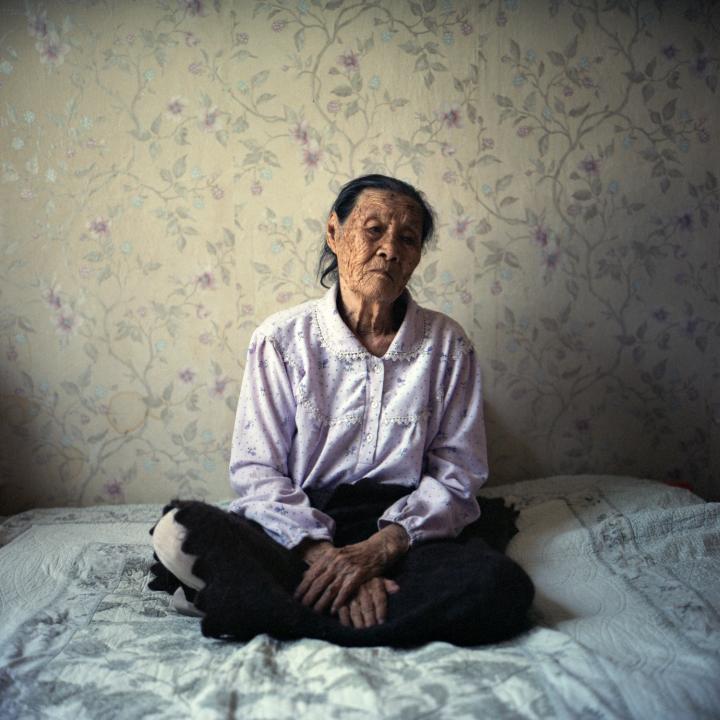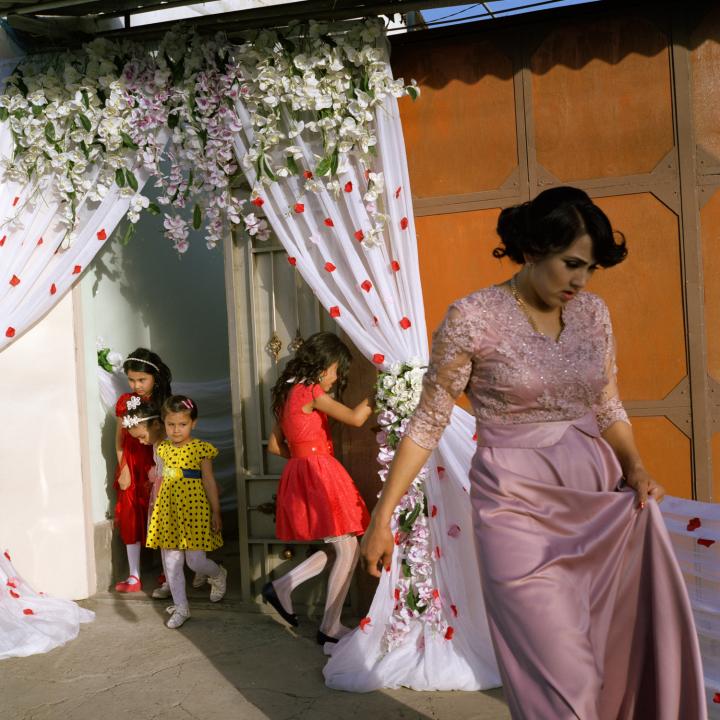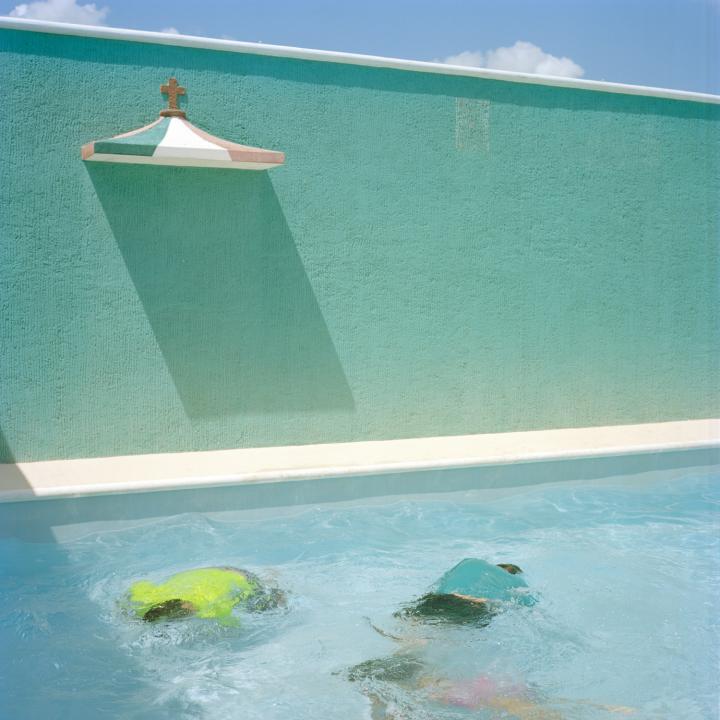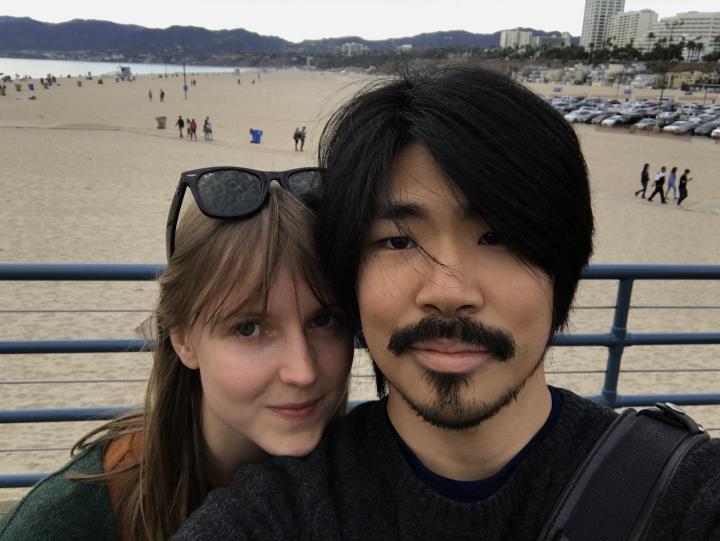In our view
Meet the award-winning photographer and writer couple producing thought-provoking journalistic collaborations.
Argentina and London-based award-winning photojournalist Michael Vince Kim and freelance writer and journalist Elizabeth Sulis Kim met during their studies at the University. Here they reveal how their mutual appreciation of languages, linguistics and images brought both them and their careers together.

Michael, you studied film directing at Universidad del Cine in Buenos Aires, Argentina, before coming to Edinburgh to study linguistics. What made you decide to relocate and choose this subject?
MVK: "Looking back, I realise that all of my projects while studying film directing were about my own identity as the son of Korean immigrants living in Argentina, a trend that is present in my work to this day. I had been introduced to semiotics while in secondary school, and I also had it as a subject at university. The interpretation of signs and symbols is obviously very important in visual communication – it was the best tool I had to learn how to express myself with the language of film, metaphorically speaking.
"At the same time, bilingualism had always played an important role in my life as I was brought up speaking Korean and only learned Spanish after being sent to preschool in Argentina. Spanish is now my first language, and although my Korean has improved with time, the language I speak with my parents is still a Korean-Spanish pidgin. It only seemed natural to subsequently become interested in linguistics, as a way to understand this form of communication which is part of my identity."

How did you get into photography and photojournalism?
MVK: "I’ve dabbled in documentary photography since I was 15. While at university I got involved in photographing indie and punk bands in Glasgow and Edinburgh. In third year, I came across Koryo-mar, a dying Korean dialect spoken by Koreans in the post-Soviet states. I was fascinated by it, given my background, and I thought it would be a good idea to document the dialect. As a visual person, I naturally decided to portray its speakers too through photography.
"I wrote my dissertation on Koryo-mar, more specifically on language contact and attrition. At the time, I had been attending professor Bert Remijsen’s lectures on linguistic fieldwork and he also happened to be my personal tutor, so he gave me personal as well as academic advice. For research, I travelled to a remote town in Kazakhstan called Ushtobe, which is the first town to which Koreans were deported from the Russian Far East in 1937.
"There are no hotels in that town, so I just went there and by pure chance managed to find a place to stay for a couple of weeks while doing my research. Language is an important cultural marker of identity, so the linguistic aspect of the project influenced the visual side."

Can you briefly describe your career path since graduating in 2015?
MVK: "The photographs I took in Kazakhstan culminated in the project "Far from distant shores".
"After coming back, I submitted the photographs to a competition organised by Magnum Photos and Ideas Tap entitled "30 Under 30", which involved portfolio reviews with industry professionals and an exhibition at the NEC Birmingham. I hadn’t expected anything but I was surprised to be selected. This motivated me to give photography a go and I enrolled to do an MA in Photojournalism and Documentary Photography at London College of Communication.
"During this time, I received grants, including the Royal Photographic Society Postgraduate Bursary, that allowed me to continue my work in Central Asia and to start my following project, “Aenikkaeng”, about the story of a thousand Koreans who, in 1905, were deceived into indentured servitude in Mexico. In 2017, it won the first prize in the People Stories category of the World Press Photo Contest and the Magnum Graduate Photographers Award."

How did you and Elizabeth meet?
MVK: "We were in Italian class in October 2011. I distinctly remember the first time we met. It was during first year. I had been placed in the intermediate Italian class but asked to be in the advanced class after a couple of weeks. I was late for my first class with the advanced group. I rushed into the building on Buccleuch Place, behind the Main Library, and I sat on the only empty chair. Next to me was Elizabeth. I didn’t have the textbook yet, but luckily she was happy to share hers with me. We got married last year in a registry office in South Korea with two friends present."

Elizabeth, why did you choose to study French and Italian at Edinburgh?
ESK: "I didn’t. Well, not to begin with. I enrolled as a social anthropology student and took classes in history of art, Italian, linguistics and ancient Rome in my first two years. I really enjoyed learning languages, and realised my state school language learning had been somewhat disruptive – I’d studied French, then German, and then for GCSE my school did away with those languages and I had to start from scratch with Spanish.
"I felt learning a language was a good way to get an insight into a culture, so I opted to change my degree to Modern Languages. I picked up French again and learned Italian. I received scholarships to study in language schools in both countries over the university holidays, and spent a lot of time in Italy and Francophone countries au-pairing and travelling. I actually think starting as a beginner again was good as it enabled me to get a good foundation in the grammar and avoid some common mistakes."
Why did you decide to become a freelance writer?
ESK: "I left university feeling post-graduation blues. I didn’t have a clear idea in mind about what I wanted to do, but I’d avoided all the trade fairs and I knew I wanted to write. I suppose things just went from there – I started writing and reporting on things. I’m still learning."
Can you briefly describe your career path since graduating in 2015?
ESK: "I tried a bit of everything. I did work experience placements at the Camden New Journal and at Penguin Random House. I continued to write theatre reviews for the former. I picked up work experience and kept applying to opportunities despite often feeling like my emails weren’t being read. I did odd jobs on the side: a brief stint as a waitress in central London, promoting a nightclub (which I, admittedly, never set foot in) in the West End. I also earned some money as a photographer and English teacher in Wembley. I’m from a low-income, working-class background so, initially, it was very stressful – I definitely struggled to make ends meet.
"You soon realise writing is just a medium and you don’t necessarily like writing about everything. I’m still figuring out what I do and don’t enjoy writing about. This year has been more personal. I’ve been moving towards stories which interest me more, and thinking about authorship."
Which stories or assignments have you been most proud to work on and why?
ESK: "Recently Michael and I have been covering the abortion story in Argentina. We’ve published stories on it for the Guardian, Dazed and The Pool. It’s an important story – it’s about women demanding the right for autonomy over their own bodies. Abortion takes place whether it’s legal or not. The procedure is actually more common in Latin America than it is in regions where it’s legalised. Legalising it just makes it safer for the woman."
You’re drawn to stories that search for answers to social issues. Why?
ESK: "Compassion fatigue is a real thing. I know many people read and watch the news religiously and feel depressed by everything that is going on in the world. People often feel helpless because they feel unable, as individuals, to tackle the problem. So, they sink into this cycle of passive consumption of tragedy. Instead of giving in to this, it would be nice to present people with solutions – things they can do to change the situation, through things like lifestyle changes, for example, reducing meat consumption, participating in grassroots movements, and so on, or present larger scale solutions we could collectively work towards as a society."
When and how did your collaborative working arrangement with Michael come about?
ESK: "When we moved in together in London. Michael got a photography assignment from Huck magazine and I ended up writing the articles. It was a series of articles about refugees who had settled in London. Huck liked couple collaborations.
"Since then, we’ve maintained the same dynamic. We share the research aspect. I write and Michael takes photos. We live together so we can talk about collaborations in great depth without professional boundaries you might have with a collaborator who is not a friend or a partner. We can be more honest with each other."
What would your ideal assignment be?
ESK: "I would like to write more about ecology, wildlife and animal exploitation. Given the recent vegan boom, I think young people are starting to see animals differently, and this is exciting. I would also like the opportunity to write more long-form articles."
What are some of your favourite publications and why?
ESK: "There are so many. I like The New Yorker and the New York Times, I also like independent magazines such as Oh Comely and TANK. The United States has a culture of long-form journalism, which isn’t as common in the UK – people like Joan Didion helped shape this tradition. News is never objective, we always influence readers through what we present: the quotes we choose, the case studies, the use of language and so on. I like this transparent, subjective journalism, which is closer to literary non-fiction – which includes introspection and emotion and makes a story relatable by weaving in personal experience. News is so often about statistics – it should be more about generating empathy."
Find out more

